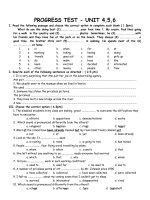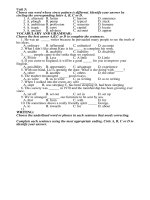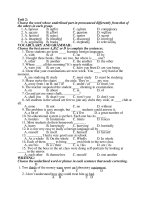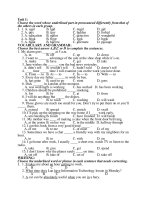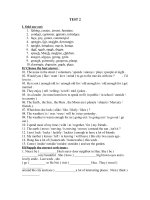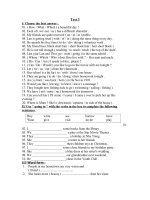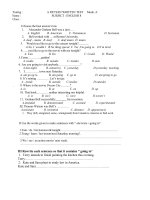Handout for unit 1
Bạn đang xem bản rút gọn của tài liệu. Xem và tải ngay bản đầy đủ của tài liệu tại đây (244.94 KB, 8 trang )
Parts of speech & Basic sentence patterns Grammar1: Words & Phrases
PARTS OF SPEECH &
BASIC SENTENCE PATTERNS
A. PARTS OF SPEECH TABLE
This is a summary of the 8 parts of speech*. You can find more detail if you click on each part of
speech.
Part of speech Function Example Context
Verbs
động từ
shows action or
state
(to) be, have, do, like,
work, sing, can, must
EnglishClub.com is a web site. I
like EnglishClub.com.
Nouns
danh từ
names persons,
things, places or
ideas
pen, dog, work, music,
town, London, teacher,
John, happiness
This is my dog. He lives in my
house. We live in London.
Pronouns
đại từ
replaces nouns I, you, he, she, some Tara is Indian. She is beautiful.
Adjectives
Tính từ
describes nouns &
pronouns
a/an, the, 2, some, good,
big, red, well, interesting
I have two dogs. My dogs are big. I
like big dogs.
Adverbs
Trạng từ, phó từ
describes verbs,
adjectives or other
adverbs
quickly, silently, well,
badly, very, really
My dog eats quickly. When he is
very hungry, he eats really quickly.
Prepositions
giới từ
links a noun to
another word
to, at, after, on, but We went to school on Monday.
Conjunctions
liên từ
joins clauses or
sentences or words
and, but, when
I like dogs and I like cats. I like cats
and dogs. I like dogs but I don't
like cats.
Interjections
thán từ
express emotions,
or are fillers in
sentences
oh!, ouch!, hi!, well
Ouch! That hurts! Hi! How are
you? Well, I don't know.
* Some grammar sources categorize English into 9 or 10 parts of speech. Examples of other
categorizations are:
• Verbs may be treated as two different parts of speech:
o Lexical Verbs (work, like, run)
o Auxiliary Verbs (be, have, must)
• Determiners may be treated as a separate part of speech, instead of being categorized under
Adjectives
XH528-Grammar 1
1
Parts of speech & Basic sentence patterns Grammar1: Words & Phrases
VERBS
A verb is often defined as a word which shows action or state of being. The verb is the heart of a
sentence - every sentence must have a verb. Recognizing the verb is often the most important step in
understanding the meaning of a sentence.
- In the sentence The dog bit the man, bit is the verb and the word which shows the action of the
sentence.
- In the sentence The man is sitting on a chair, even though the action doesn't show much
activity, sitting is the verb of the sentence.
- In the sentence She is a smart girl, there is no action but a state of being expressed by the verb
is. The word be is different from other verbs in many ways but can still be thought of as a verb.
Unlike most of the other parts of speech, verbs change their form.
- Sometimes endings are added: learn – learned, learn – learns, go – goes
- Sometimes the word itself becomes different: teach-taught
- The different forms of verbs show different meanings related to such things as
* tense: past, present, future
* person: first person, second person, third person
* number: singular, plural
* voice: active, passive.
- Verbs are also often accompanied by verb-like words to give them different meanings:
* modals: may, could, should, etc.
* auxiliaries: be, do, have, etc. .
A verb which has an object is called a transitive verb and some examples are throw, buy, hit, love.
A verb which has no object is called an intransitive verb and some examples are go, come, walk.
CONJUNCTIONS
A conjunction is a word that connects other words or groups of words. There are 2 types of
conjunctions:
- Coordinating conjunctions are conjunctions which connect two equal parts of a sentence. The most
common ones are and, or, but, and so which are used in the following ways:
Conjunctions Uses Example
AND
BOTH … AND
join or add words together They ate and drank.
Bob and Dan are friends.
He speaks both English and French.
OR
EITHER … OR
NEITHER … NOR
show choice or possibilities He will be here on Monday or Tuesday.
He can’t (either) read or write.
He can neither read nor write.
BUT
show opposite or conflicting
ideas
She is small but strong.
It is early but we can go.
SO
show result I was tired so I went to sleep.
XH528-Grammar 1
2
Parts of speech & Basic sentence patterns Grammar1: Words & Phrases
NOT ONLY … BUT ALSO
He is not only intelligent but also modest.
- Subordinating conjunctions connect two parts of a sentence that are not equal and will be discussed
more in another class. For now, you should know some of the more common subordinating
conjunctions such as: after, although, as, because, before, how, if, once, since, than, that, though, till,
until, when, where, whether, while
Example: Ram went swimming although it was raining.
Ram went swimming while it was raining.
- Besides, the Adverbs/Conjunctions such as Besides, However, Nevertheless, Otherwise, So,
Therefore, Still, Yet, Though can join clauses or sentences and are then often known as ‘conjuncts’.
But they can also, with the exception of nevertheless and therefore (conjuncts), be used in other ways.
Their position will vary according to how they are used.
BESIDES + N (prep.) in addition
to
- Besides doing the cooking I look after the garden.
BESIDES, clause (conjunct) in
addition
- I can’t go now; I’m too busy. Besides, my passport is
out of date.
HOWEVER+ADJ/ADV (Adv of Degree) - You couldn’t earn much, however hard you worked.
HOWEVER, (conjunct)
but/
nevertheless tuy
nhiên/ all the same
dù sao đi nữa
- I’ll offer it to Tom. However, he may not want it.
- He may not want it however.
- Tom, however, may not want it.
- If, however, he doesn’t want it, …
- They hadn’t trained hare, but/however/nevertheless/all
the same they won.
OTHERWISE
usuallly comes after V
(adv of manner) in
a different way
- It must be used in a well-ventilated room. Used
otherwise it could be harmful.
OTHERWISE (conjunct)
if not/ or else
- We must be early; otherwise we won’t get a seat.
- We must be early or (else) we won’t get a seat.
(colloquial)
SO + ADJ/ADV (adv of degree) - She was so angry that she couldn’t speak.
SO precedes a clause (conjunct) therefore - Our cases were heavy, so we took a taxi.
- Our cases were heavy; therefore we took a taxi.
- Our cases were heavy; we therefore took a taxi.
STILL (adv of time) - The children are still up.
STILL
come at the beginning of
the cl.
(conjunct)
admitting that/
nevertheless
- You aren’t rich; still, you could do something to help
him.
YET (adv of time) - They haven’t had supper yet.
YET
come at the beginning of
the cl.
(conjunct) in spite
of that/ all the
same/ nevertheless
- They are ugly and expensive; yet people buy them.
THOUGH introduces cl.
of concession
although - Though /Although they’re expensive, people buy them.
THOUGH links 2 main
cl.
but/yet - He says he’ll pay, though I don’t think he will.
- He says he’ll pay, I don’t think he will, though.
XH528-Grammar 1
3
Parts of speech & Basic sentence patterns Grammar1: Words & Phrases
INTERJECTIONS
1. Definition: An interjection is a word that expresses some kind of emotion. It can be used as filler.
Interjections do not have a grammatical function in the sentence and are not related to the other parts of
the sentence. If an interjection is omitted, the sentence still makes sense. It can stand alone.
E.g. - Ouch! That hurts.
- Well, I need a break.
- Wow! What a beautiful dress!
When you are expressing a strong emotion, use an exclamation mark (!). A comma (,) can be used for a
weaker emotion.
SITUATION INTERJECTION EXAMPLE
agreement okay, right, sure, yeah, yes, uh-huh Yes, I'll come with you.
alarm/ call
attention
egad, hey, oh oh, yikes Yikes! That's pricey!
amazement cool, gee, gee whiz, golly, goodness, holy cow,
sick, wicked, wow
Wow! How did you do that?
compliment bravo, encore, congratulations Bravo! You got an A+.
comfort ooh Ooh! This blanket is so cosy.
contentment mmmm, yum, yummy Mmmm! Chocolate cake!
disbelief, doubt huh? what? Huh? She did what?
dissatisfaction humph Humph! We'll just see about
that.
gratitude thanks Thanks, you've been a great
help.
greeting hello, hi Hello, Michela. Did you have a
nice day?
grief or pity alas Alas! There's no more cake left.
hesitation/pause er, hmm, uh, well Er, well, I don't know what to
say.
XH528-Grammar 1
4
Parts of speech & Basic sentence patterns Grammar1: Words & Phrases
partings bye, bye-bye, goodbye, so long Bye for now!
pain ouch, ow Ow! You hurt me!
relief phew Phew! I just made it to class.
special occasions Happy Birthday, Merry Christmas Happy Birthday, Ayesha!
B. BASIC SENTENCE PATTERNS
Sentences may be classified into 5 basic sentence patterns according to the formation of the
Predicate.
I. Pattern 1
S + V
i
(+ modifier) The dog died.
The small dog died painfully right here last night.
II. Pattern 2
S + V
L
+ S.C (+ modifier)
The child looks healthy.
The child fed by Babylac Milk looks very healthy.
LIST of English linking verbs
•
- to be : thì, là
- to appear: dường như, như thể
= to seem
- to become: trở nên, trở thành
= to get
= to turn
= to go
= to grow
- to feel: cảm thấy
- to look: trông có vẻ
- to prove: tỏ ra là, chứng tỏ là
- to remain: vẫn
= to stay
- to taste: có vị
- to smell: có mùi
-to sound: nghe như, nghe có vẻ
III. Pattern 3
S + V
t
+ O (+ modifier)
Mr. Brown buys a hat.
Mr. Brown, who lives near my house, buys an expensive new
hat from that store.
IV. Pattern 4
(a) S + V
t
+ IO + DO (+ modifier) Her uncle gave the boy a bicycle.
XH528-Grammar 1
5

